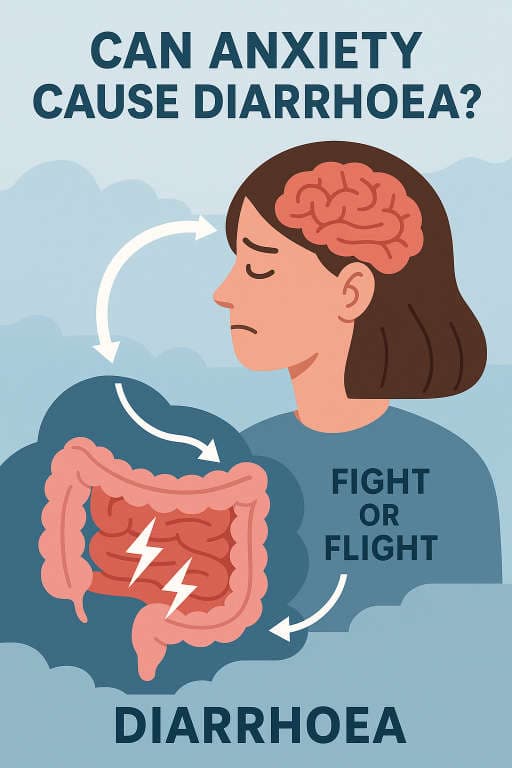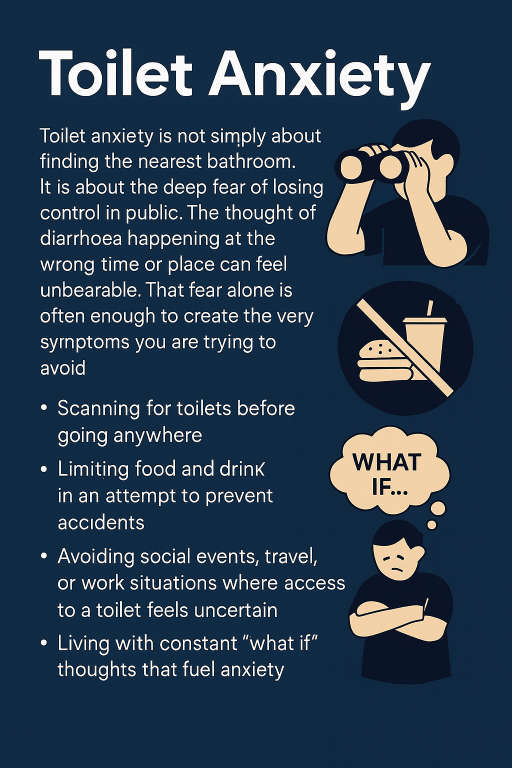Yes, can anxiety cause diarrhoea because the gut–brain axis allows the brain to send signals to the gut, triggering a fight or flight response that speeds up digestion and causes diarrhoea, especially in situations of high stress or a chronic condition like irritable bowel syndrome (IBS). Managing anxiety through relaxation techniques, lifestyle changes, and addressing underlying causes can help reduce these symptoms.
For people with toilet anxiety, the question can anxiety cause diarrhoea is not just academic, it is central to their daily life. The fear of diarrhoea is often at the heart of toilet anxiety. Many clients tell me they are not frightened of the toilet itself, but of what might happen if they cannot reach one in time. This single worry can spiral into obsessive checking, restricting what they eat or drink, or even avoiding leaving the house altogether.

Table of Contents
- Why Can Anxiety Cause Diarrhoea and How It Creates Toilet Anxiety
- The Physiology Behind The Question Can Anxiety Cause Diarrhoea
- The Fear of Losing Control
- The Lived Experience of Anxiety and Diarrhoea
- Why Standard Advice Falls Short
- How Subconscious Fear Patterns Are Created
- SICH’s Approach to Toilet Anxiety
- FAQs About Anxiety, Diarrhoea, and Toilet Anxiety
- Taking the Next Step
Why Can Anxiety Cause Diarrhoea and How It Creates Toilet Anxiety
The gut–brain axis is the two–way communication channel between your digestive system and your nervous system. When anxiety activates the fight or flight response, it changes how your gut works. Intestinal contractions speed up, digestion becomes less efficient, and the body is primed for immediate action, not calm digestion. For many people, this results in urgency and diarrhoea, often described as nervous diarrhoea. When asking can anxiety cause diarrhoea, the answer lies directly in this stress-driven change in gut function.
In toilet anxiety, the problem is magnified. Once you have had one bad experience, the memory lingers. Your brain remembers that diarrhoea happened before and begins to anticipate it happening again. This anticipation is enough to set off the same stress response, which then triggers the gut. Soon you are caught in a loop: fear of diarrhoea leads to anxiety, anxiety affects digestion, and symptoms reinforce the fear.
The Physiology Behind The Question Can Anxiety Cause Diarrhoea
When you feel anxious, your body releases adrenaline and cortisol. These stress hormones are designed to prepare you for survival. Heart rate rises, breathing quickens, and blood is diverted towards the muscles. At the same time, the vagus nerve, which regulates the gut, becomes overstimulated. This causes the intestines to contract more quickly than normal, pushing contents through before water can be reabsorbed, resulting in diarrhoea.
This is not imagined, nor is it simply psychological. It is a real physical reaction driven by your nervous system. Over time, repeated activation of this response trains the body to overreact to even mild stress. That is why people with toilet anxiety can experience gut urgency at the mere thought of leaving home, even when nothing is physically wrong with their digestion. For them, the question can anxiety cause diarrhoea is answered every day through lived experience.
The Fear of Losing Control
Toilet anxiety is not simply about finding the nearest bathroom. It is about the deep fear of losing control in public.
The thought of diarrhoea happening at the wrong time or place can feel unbearable. That fear alone is often enough to create the very symptoms you are trying to avoid.
This is why people with toilet anxiety often find themselves:
- Scanning for toilets before going anywhere
- Limiting food and drink in an attempt to prevent accidents
- Avoiding social events, travel, or work situations where access to a toilet feels uncertain
- Living with constant “what if” thoughts that fuel anxiety
Over time, these behaviours reinforce the idea that your body cannot be trusted, which only strengthens the cycle.

The Lived Experience of Anxiety and Diarrhoea
Clients often describe how toilet anxiety gradually takes over everyday life. A simple shopping trip becomes an ordeal of planning toilet stops. A work meeting feels unbearable because slipping out discreetly seems impossible. Travel, once enjoyable, now feels terrifying because of the fear of long journeys without a bathroom nearby. Some people even avoid visiting friends or family because they worry about using someone else’s toilet.
The embarrassment is often hidden. From the outside, others may not realise what is happening, but inside the person is battling constant fear and body monitoring. This hidden struggle creates feelings of shame, loneliness, and frustration. It is not uncommon for people to feel they are the only ones with this problem, when in reality toilet anxiety is far more common than most realise. For many, the repeated thought can anxiety cause diarrhoea becomes a daily torment.
Why Standard Advice Falls Short
General advice about managing anxiety through relaxation, diet changes, or lifestyle shifts can sometimes help with short–term diarrhoea. But for toilet anxiety, these strategies often backfire. Instead of reassuring you, they can become part of your coping system, convincing your subconscious that the danger is real and must be managed at all times.
That is why toilet anxiety rarely improves by itself. Coping mechanisms keep the fear alive because they tell your brain that you cannot cope without them.
How Subconscious Fear Patterns Are Created
The subconscious mind learns from repetition and strong emotion. If you experience nervous diarrhoea in a stressful situation, the subconscious marks it as a danger signal. The next time you are in a similar situation, the subconscious sounds the alarm even before your conscious mind notices. This automatic response happens faster than thought.
Each time this loop repeats, the pattern becomes stronger. Soon the body reacts to imagined threats with the same urgency as real ones. What started as a single bad experience turns into a learned fear that colours many parts of life.
SICH’s Approach to Toilet Anxiety
At The Surrey Institute of Clinical Hypnotherapy (SICH), we use methods developed from Paul Howard’s pioneering work and research in the field of toilet anxiety over the last 20 years. Our approach focuses on breaking the cycle of fear at its root. Instead of relying on surface-level coping techniques, we work directly with the subconscious mind to restore natural confidence and calm responses.
This tailored toilet anxiety treatment is about creating long-term change, not short-term fixes. Clients often describe the process as transformative. They notice that events which once felt impossible become manageable, then routine. For many, the question can anxiety cause diarrhoea becomes far less frightening, because their lived experience starts to show them that the body can be trusted again.
These methods are built on Paul Howard’s pioneering work and research in the field of toilet anxiety over the last 20 years. Through these methods, SICH clients are guided to replace avoidance with confidence, moving away from fear-driven behaviours towards natural, calm responses. This tailored toilet anxiety treatment is about creating long-term change, not short-term fixes.
Clients often describe the process as transformative. They notice that events which once felt impossible become manageable, then routine. For many, the question can anxiety cause diarrhoea becomes far less frightening, because their lived experience starts to show them that the body can be trusted again.
FAQs About Anxiety, Diarrhoea, and Toilet Anxiety
Anxiety alone can trigger diarrhoea through the gut–brain axis. IBS can make it worse, but many people with toilet anxiety do not have IBS. Their symptoms are driven by fear and nervous system responses.
This is a classic sign of toilet anxiety. At home, you feel safe, so your nervous system remains calmer. Out in public, the question can anxiety really cause diarrhoea and fear of losing control triggers the anxiety response, which then affects your gut.
Not necessarily. Nervous diarrhoea can occur without IBS. It often arises from anxiety alone, especially in the context of toilet anxiety.
Food may influence gut comfort, but the core issue in toilet anxiety is not what you eat, it is how your subconscious reacts. Relying on food avoidance usually reinforces the belief that your gut cannot be trusted.
Yes. Hypnotherapy helps to reprogramme the subconscious so that situations that once triggered panic become neutral again. Over time, your brain learns that your body can be trusted and the cycle breaks.
Children often respond in half the number of sessions adults need, but most adults see significant changes within a handful of sessions. Because SICH uses structured, targeted techniques, many clients notice progress faster than expected.
Taking the Next Step
If the question can anxiety cause diarrhoea feels painfully personal, you may already be living with toilet anxiety. The good news is that this condition is highly treatable once the right approach is used.
At SICH, we specialise in using hypnotherapy to retrain the subconscious responses that are keeping you stuck. Instead of fearing the worst, you can regain trust in your body and return to normal behaviours.
To find out more and begin your recovery, visit our page on toilet anxiety help that actually works. This page explains the process in more detail and shows how you can start changing your life today.
